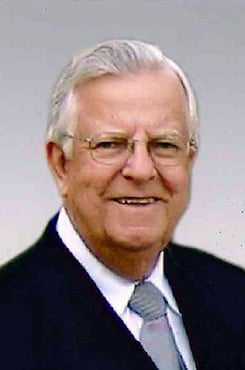Lawyers Remember Judge Conley Ingram for 'Easy Southern Charm' in Court
On the bench, Ingram was so charming that sometimes it was difficult for litigants to realize when they'd lost. "Both sides would think they'd won," recalled Cobb Superior Court Judge Robert E. Flournoy III. "He just granted summary judgment against you but he did it in such a way that you'd say, 'That's nice of you.'"
November 12, 2019 at 09:57 PM
6 minute read
 Judge G. Conley Ingram, Marietta, Georgia. (Courtesy photo)
Judge G. Conley Ingram, Marietta, Georgia. (Courtesy photo)
Conley Ingram is being remembered as a judge who made people feel good about what happened in court—even when they lost.
Ingram, a retired senior judge on the Cobb County Superior Court and a former justice on the Georgia Supreme Court, died Monday at his home in Marietta at the age of 89.
"The entire Cobb bench and bar is saddened by the loss of one of the best judges to ever serve in Cobb County," Cobb Superior Court Chief Judge Reuben M. Green said Tuesday in an email. "Judge Conley Ingram was the epitome of what a judge should be: humble, kind, patient and fair to all who appeared before him. He was the judge the rest of us wanted to emulate. He will be sorely missed by all who knew him."
Ingram was born Sept. 27, 1930. He attended law school at Emory University. He practiced privately in Marietta before becoming a judge. He served on the Cobb Juvenile Court, the Cobb Superior Court and the Supreme Court of Georgia, where he was a justice from 1973 to 1977. He left the high court to become a partner at the Atlanta law firm Alston & Bird, where he worked for 21 years. In 1998, he retired from the firm to become a senior judge in Cobb Superior Court, where he served until he retired in September of this year.
"To me, Judge Ingram was an icon, a giant in small stature," Cobb Superior Court Judge C. LaTain Kell said. "But more than that, he was one of the kindest gentlemen I have had the privilege of knowing in the practice of law. When I first came on the bench, he would drop by at least weekly to check on me, offering assistance, encouragement and friendship. Cobb County and the State of Georgia will miss him, and I personally will miss him greatly."
Two of the lawyers Ingram mentored were his own daughters: Cobb County Superior Court Judge S. Lark Ingram and Warner Bates appellate attorney Nancy Ingram Jordan, a former prosecutor in the Cobb County District Attorney's Office. Ingram and his wife of 67 years, Sylvia Ingram, also have a son, Conley Ingram IV.
"I grew up down the street from Judge Ingram and his wonderful family," Cobb Superior Court Judge Gregory Poole said. "In all the years I knew him, in the courtroom and out, he exhibited a keen intellect, a love of the law, and an easy Southern charm. I will miss him dearly."
On the bench, Ingram was so charming that sometimes it was difficult for litigants to realize when they'd lost.
"Both sides would think they'd won," recalled Cobb Superior Court Judge Robert E. Flournoy III. "He just granted summary judgment against you but he did it in such a way that you'd say, 'That's nice of you.'"
One of the lawyers who had to break such bad news to clients on occasion was Flournoy's father, the late Cobb Superior Court Judge Robert E. Flournoy Jr., who practiced law with Ingram before they both became judges. But Ingram became a judge years before Flournoy Jr.
"Dad said his clients would say, 'I do believe that Judge Ingram would have ruled for us, but the law wouldn't let him do it," Flournoy III recalled.
Flournoy III said he knew why Ingram decided to leave the bench and return to private practice. "He needed to make more money," Flournoy said. "He had three children in college—two in law school."
But the financial considerations weren't the only ones that led Ingram to become one of the few high court justices to step down before either reaching retirement age or completing service as the court's chief. Ingram told a reporter a decade ago that he felt lonely cloistered at the Supreme Court, rarely seeing anyone from the outside.
Superior Court was different.
"He really did enjoy being a trial court judge where human beings came in front of him every day," Flournoy III said. "He could help them resolve whatever difficulties they had in life."
When Ingram decided to retire from Alston & Bird at 68, he wanted to return to trial court as a senior judge. But he couldn't do it. The law required 10 years of experience either on a superior court or an appellate court. Ingram had served four-year stints on juvenile, superior and supreme courts but not 10 years on any one of them.
So the Georgia General Assembly passed a special law changing those requirements to 10 years of total service as a judge. The legislators called it the Conley Ingram bill. The year it became law, Ingram became a senior judge, substituting when needed on the superior court.
Because he served so long, Ingram developed relationships with lawyers over multiple generations.
"My first interaction with Judge Conley Ingram was during a temporary protective order hearing about 10 years ago," Cobb Judicial Circuit District Attorney Joyette Holmes said by email Tuesday. "I was a private attorney representing a young lady seeking protection. Judge Ingram made a frightening experience for my client one where she knew she was heard and could walk away with a measure of relief."
Holmes became an admirer after that. "From that day forward, my interactions with Judge Ingram have always been wonderful," she said. "We have lost a giant—a giant for his family, for this state and for the legal profession."
Criminal defense attorney and Cobb County Bar Association past president H. Maddox Kilgore of Kilgore & Rodriguez in Marietta said walking into a courtroom to find Ingram on the bench was "like winning the judge lottery."
"As a lawyer, you knew that you were going to get a fair hearing, no matter the issue," Kilgore said. "And you knew that he would speak to the lawyers and parties with a calm, respectful demeanor, which just made the courtroom anxiety melt away. No doubt Judge Ingram had the spiritual gift of a peacemaker. In the midst of the chaos and drama of the courtroom, he simply made everyone feel comfortable. He was truly a gift to our community."
This content has been archived. It is available through our partners, LexisNexis® and Bloomberg Law.
To view this content, please continue to their sites.
Not a Lexis Subscriber?
Subscribe Now
Not a Bloomberg Law Subscriber?
Subscribe Now
NOT FOR REPRINT
© 2025 ALM Global, LLC, All Rights Reserved. Request academic re-use from www.copyright.com. All other uses, submit a request to [email protected]. For more information visit Asset & Logo Licensing.
You Might Like
View All

Plaintiffs Attorneys Awarded $113K on $1 Judgment in Noise Ordinance Dispute
4 minute read
'Didn't Notice Patient Wasn't Breathing': $13.7M Verdict Against Anesthesiologists
12 minute readTrending Stories
- 1St. Jude Labs Sued for $14.3M for Allegedly Falling Short of Purchase Expectations
- 2'Ridiculously Busy': Several Law Firms Position Themselves as Go-To Experts on Trump’s Executive Orders
- 3States Reach New $7.4B Opioid Deal With Purdue After SCOTUS Ruling
- 4$975,000 Settlement Reached After Fall on Sidewalk
- 5'Where Were the Lawyers?' Judge Blocks Trump's Birthright Citizenship Order
Who Got The Work
J. Brugh Lower of Gibbons has entered an appearance for industrial equipment supplier Devco Corporation in a pending trademark infringement lawsuit. The suit, accusing the defendant of selling knock-off Graco products, was filed Dec. 18 in New Jersey District Court by Rivkin Radler on behalf of Graco Inc. and Graco Minnesota. The case, assigned to U.S. District Judge Zahid N. Quraishi, is 3:24-cv-11294, Graco Inc. et al v. Devco Corporation.
Who Got The Work
Rebecca Maller-Stein and Kent A. Yalowitz of Arnold & Porter Kaye Scholer have entered their appearances for Hanaco Venture Capital and its executives, Lior Prosor and David Frankel, in a pending securities lawsuit. The action, filed on Dec. 24 in New York Southern District Court by Zell, Aron & Co. on behalf of Goldeneye Advisors, accuses the defendants of negligently and fraudulently managing the plaintiff's $1 million investment. The case, assigned to U.S. District Judge Vernon S. Broderick, is 1:24-cv-09918, Goldeneye Advisors, LLC v. Hanaco Venture Capital, Ltd. et al.
Who Got The Work
Attorneys from A&O Shearman has stepped in as defense counsel for Toronto-Dominion Bank and other defendants in a pending securities class action. The suit, filed Dec. 11 in New York Southern District Court by Bleichmar Fonti & Auld, accuses the defendants of concealing the bank's 'pervasive' deficiencies in regards to its compliance with the Bank Secrecy Act and the quality of its anti-money laundering controls. The case, assigned to U.S. District Judge Arun Subramanian, is 1:24-cv-09445, Gonzalez v. The Toronto-Dominion Bank et al.
Who Got The Work
Crown Castle International, a Pennsylvania company providing shared communications infrastructure, has turned to Luke D. Wolf of Gordon Rees Scully Mansukhani to fend off a pending breach-of-contract lawsuit. The court action, filed Nov. 25 in Michigan Eastern District Court by Hooper Hathaway PC on behalf of The Town Residences LLC, accuses Crown Castle of failing to transfer approximately $30,000 in utility payments from T-Mobile in breach of a roof-top lease and assignment agreement. The case, assigned to U.S. District Judge Susan K. Declercq, is 2:24-cv-13131, The Town Residences LLC v. T-Mobile US, Inc. et al.
Who Got The Work
Wilfred P. Coronato and Daniel M. Schwartz of McCarter & English have stepped in as defense counsel to Electrolux Home Products Inc. in a pending product liability lawsuit. The court action, filed Nov. 26 in New York Eastern District Court by Poulos Lopiccolo PC and Nagel Rice LLP on behalf of David Stern, alleges that the defendant's refrigerators’ drawers and shelving repeatedly break and fall apart within months after purchase. The case, assigned to U.S. District Judge Joan M. Azrack, is 2:24-cv-08204, Stern v. Electrolux Home Products, Inc.
Featured Firms
Law Offices of Gary Martin Hays & Associates, P.C.
(470) 294-1674
Law Offices of Mark E. Salomone
(857) 444-6468
Smith & Hassler
(713) 739-1250







